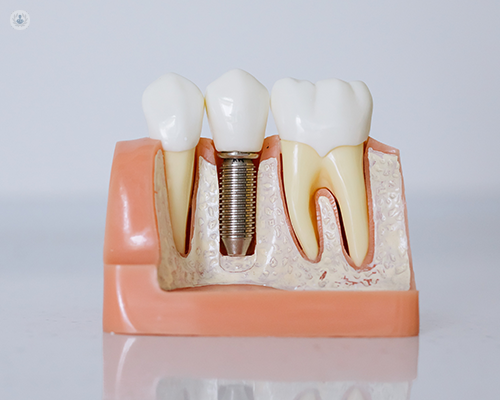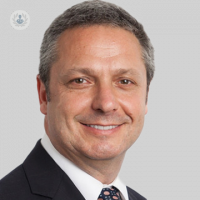Dental implants: Just like natural teeth
Written in association with:In adulthood, factors like gum disease, trauma, cavities and poor oral hygiene can lead to the loss of our teeth. To replace these missing teeth - and in turn, restore dental health - some people may choose to consider dental implants, artificial teeth roots made of titanium with a ceramic crown on top that produce very natural results.
Here to provide an expert insight into dental implants is Dr David Bloom, one of the UK’s leading restorative and cosmetic dentists.

When might dental implants be considered? How similar are they to natural teeth?
Dental implants are a great option to replace missing teeth so that your natural teeth do not have to be used - and generally prepared - to support missing teeth. Implants are also a great option to replace dentures, either partial or complete, that are given for fixed replacement teeth that do not come out.
Who can get dental implants?
Most patients are suitable for dental implants. However, smokers need to be aware that, for them, there is a greater risk that the implants will not integrate (bone fuse) onto their teeth. Usually, the mouth should also be free of active gum disease before the dental implants are placed.
To avoid complications, a patient’s full medical history will be taken beforehand to check for medical conditions or medications, more likely, that may present an issue.
What are the different steps involved in the dental implant process? When is bone grafting required?
Implants are used to replace missing teeth. If they are used to replace a tooth that is still present, the first question is if the implant can be placed at the same time as the extraction (an immediate placement) or if there needs to be a delay (a delayed placement). The delay is usually required if there is an active infection.
The next question involves the provision of a temporary tooth. Sometimes, implants can be immediately loaded and a temporary tooth placed on the implant at the same time as placement. If this is not possible, there are other options available, meaning that patients will not need to be without a tooth.
After a period of approximately three months, a final impression is taken to allow the fabrication of the final replacement tooth or teeth.
If there is insufficient bone to allow placement, then various bone grafting techniques may still allow implants to be considered as an option.
How is the dental implant placed? Is it a painful procedure?
During the procedure, a hole is drilled into the bone and the implant placed in this hole. This should not be painful as local anaesthetic will be used.
The process should feel no different to a filling, but some discomfort and swelling afterwards is to be expected, as it is still a minor operation. Nervous patients can consider sedation to help.
Why is there a several-month wait before the crown can be fitted onto the implant?
Implants generally have up to a 98 per cent success rate for osseointegration (fusion with the bone). However, this still means that two per cent do not integrate.
A three-month wait allows time for osseointegration to occur and for the final soft tissue (gum) shape to be established.
How should patients take care of their dental implants following surgery? What lifestyle changes should be adopted to make them last longer?
It is essential that dental implants are cleaned just like natural teeth or there is a high chance that gum disease will develop around them. Therefore, regular hygienist follow-up visits are essential, to help maintain oral health. This is especially important for smokers, as they are more likely to develop gum disease and hence, experience problems around their dental implants.
Regular follow-up appointments with a dentist are also crucial, to monitor the dental implants, the natural teeth and the bite.
If you are considering dental implants and wish to discuss your options with an expert, don’t hesitate to visit Dr Bloom’s Top Doctors profile today.


